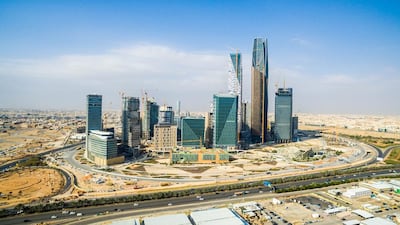Saudi Arabia last week sent a powerful message of intent to transform itself away from being an oil-dependent economy to a fully diversified one, as the “crude realities” of a persistently low oil price has driven an urgent reappraisal of the kingdom’s economic future.
If the initial insights into the proposed national transformation plan are to be believed, then the process of change will be based on the privatisation of state-owned assets, rationalisation of subsidies and government spending, as well as pioneering new sources of revenue.
With oil prices dropping persistently below Saudi Arabia’s fiscal break-even level of about US$80 per barrel, it is clear that the room for spending by the government has declined substantially, leaving it ill-equipped to deal with the mounting list of priorities it faces at home and abroad.
The options faced by the kingdom to alleviate its financial constraints have become increasingly limited, as the Saudi Arabian monetary agency’s (Sama) foreign assets have plummeted to $584.43 billion at the end of February 2016 from $723.39bn at the end of 2014, increasing the urgency to consider new forms of financing and revenue-raising measures, as well as to reduce the dependence of the private sector on government funds.
This was already amply reflected in the 2016 budget, where spending in 2016 was projected to be 13.8 per cent lower than in 2015. A new budget support provision with an allocation of $49bn was also introduced to help in dealing with the fluctuation in revenues. Even with these measures the fiscal deficit for 2016 is still likely to be about 13.9 per cent of GDP, only a little below the 15 per cent deficit for 2015.
The strain of funding this deficit is being felt on domestic banking sector liquidity, with Saudi Arabia’s banking sector loan-to-deposit ratio rising to 88.1 per cent in February from 76 per cent at the end of 2014. All these factors are, cumulatively, likely to have an impact, with GDP growth expected to slow to 1.9 per cent in 2016 from 3.4 per cent in 2015.
The most eye-catching new initiative being proposed is the privatisation of state-owned companies, including that of the oil major Saudi Aramco.
Prince Mohammed bin Salman, the deputy crown prince, hinted that up to 5 per cent of Aramco will be listed by 2018, with the proceeds being put into a new sovereign wealth fund, the Public Investment Fund.
While there are multiple estimates about the valuation of Aramco, even a conservative one suggests that the company’s IPO would be the largest in the world. And even though the obvious focus has been on Aramco, other assets, including various airports, are also likely to be sold off.
Another key aspect of the strategy seems to be a rationalisation of subsidies and government spending. The government made a start on these at the beginning of this year, when it partly reduced fuel subsidies. It also revisited government contracts that were not operational and cancelled a significant number of them.
As part of initiatives to generate additional non-oil revenues of as much as $100bn, Saudi Arabia in conjunction with other GCC countries has agreed to impose a VAT [value added tax] of 5 per cent from 2018.
Additionally, reports indicate that the Saudi government is working on a programme similar to a Green Card system and fees that employers can pay to hire additional foreign workers beyond the official quota.
It is also suggested that the government is working on the idea of a “sin tax” being applied to energy and soda drinks.
Most of the steps being proposed by the government look promising and sensible and, if implemented efficiently, could help to transform the economy into one of the leading emerging market economies of the world.
However, attempts to diversify the economy in the past and the development of a self-perpetuating non-oil sector have proved more difficult than Saudi planners had envisioned, with real income growth still heavily dependent on government spending, which was largely facilitated by oil revenues. Therefore, the government could never afford to neglect the oil sector, the primary engine of economic growth.
However, with the oil price outlook increasingly uncertain, the development of alternative sources of growth can no longer be neglected.
Tim Fox is the chief economist and head of research at Emirates NBD.
business@thenational.ae
Follow The National's Business section on Twitter


